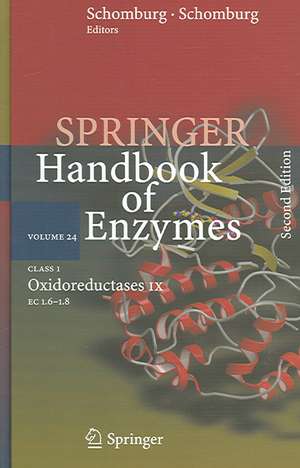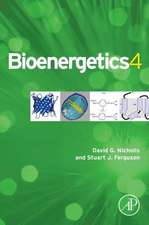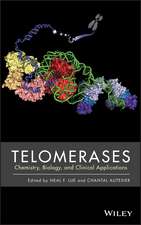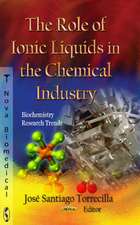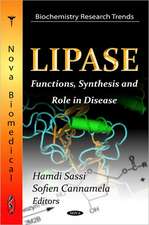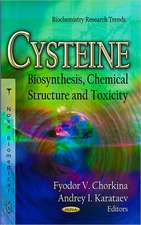Class 1 Oxidoreductases IX: EC 1.6 - 1.8: Springer Handbook of Enzymes, cartea 24
Antje Chang Editat de Dietmar Schomburg, Ida Schomburgen Limba Engleză Hardback – 20 mai 2005
This new, second edition reflects considerable progress in enzymology: many enzymes are newly classified or reclassified. Each entry is correlated with references and one or more source organisms. New datafields are created: application and engineering (for the properties of enzymes where the sequence has been changed). The total amount of material contained in the Handbook has more than doubled so that the complete second edition consists of 39 volumes as well as a Synonym Index. In addition, starting in 2009, all newly classified enzymes are treated in Supplement Volumes.
Springer Handbook of Enzymes is an ideal source of information for researchers in biochemistry, biotechnology, organic and analytical chemistry, and food sciences, as well as for medicinal applications.
Din seria Springer Handbook of Enzymes
- 24%
 Preț: 1611.36 lei
Preț: 1611.36 lei - 18%
 Preț: 1844.99 lei
Preț: 1844.99 lei - 18%
 Preț: 1843.73 lei
Preț: 1843.73 lei - 24%
 Preț: 1573.72 lei
Preț: 1573.72 lei - 18%
 Preț: 2111.59 lei
Preț: 2111.59 lei - 18%
 Preț: 1838.38 lei
Preț: 1838.38 lei - 18%
 Preț: 1849.41 lei
Preț: 1849.41 lei - 18%
 Preț: 1851.62 lei
Preț: 1851.62 lei - 18%
 Preț: 1833.16 lei
Preț: 1833.16 lei - 18%
 Preț: 1833.33 lei
Preț: 1833.33 lei - 18%
 Preț: 1833.48 lei
Preț: 1833.48 lei - 18%
 Preț: 1829.36 lei
Preț: 1829.36 lei - 18%
 Preț: 1838.38 lei
Preț: 1838.38 lei - 18%
 Preț: 1837.75 lei
Preț: 1837.75 lei - 18%
 Preț: 1229.91 lei
Preț: 1229.91 lei - 18%
 Preț: 1828.11 lei
Preț: 1828.11 lei - 18%
 Preț: 1838.38 lei
Preț: 1838.38 lei - 18%
 Preț: 1232.71 lei
Preț: 1232.71 lei - 18%
 Preț: 1834.58 lei
Preț: 1834.58 lei - 18%
 Preț: 1833.95 lei
Preț: 1833.95 lei - 18%
 Preț: 1238.11 lei
Preț: 1238.11 lei - 18%
 Preț: 1236.99 lei
Preț: 1236.99 lei - 18%
 Preț: 1233.52 lei
Preț: 1233.52 lei - 18%
 Preț: 1234.46 lei
Preț: 1234.46 lei - 18%
 Preț: 1832.39 lei
Preț: 1832.39 lei - 18%
 Preț: 1832.39 lei
Preț: 1832.39 lei - 18%
 Preț: 1236.38 lei
Preț: 1236.38 lei - 18%
 Preț: 1233.52 lei
Preț: 1233.52 lei - 18%
 Preț: 1832.39 lei
Preț: 1832.39 lei - 18%
 Preț: 1829.86 lei
Preț: 1829.86 lei - 18%
 Preț: 1828.92 lei
Preț: 1828.92 lei - 18%
 Preț: 1842.94 lei
Preț: 1842.94 lei
Preț: 1244.26 lei
Preț vechi: 1517.40 lei
-18% Nou
Puncte Express: 1866
Preț estimativ în valută:
238.08€ • 249.25$ • 197.00£
238.08€ • 249.25$ • 197.00£
Carte tipărită la comandă
Livrare economică 05-19 aprilie
Preluare comenzi: 021 569.72.76
Specificații
ISBN-13: 9783540238553
ISBN-10: 3540238557
Pagini: 741
Ilustrații: XXIV, 717 p.
Dimensiuni: 155 x 235 x 35 mm
Greutate: 1.21 kg
Ediția:2nd ed.
Editura: Springer Berlin, Heidelberg
Colecția Springer
Seria Springer Handbook of Enzymes
Locul publicării:Berlin, Heidelberg, Germany
ISBN-10: 3540238557
Pagini: 741
Ilustrații: XXIV, 717 p.
Dimensiuni: 155 x 235 x 35 mm
Greutate: 1.21 kg
Ediția:2nd ed.
Editura: Springer Berlin, Heidelberg
Colecția Springer
Seria Springer Handbook of Enzymes
Locul publicării:Berlin, Heidelberg, Germany
Public țintă
ResearchCuprins
NAD(P)+ Transhydrogenase (B-specific).- NAD(P)+ Transhydrogenase (AB-specific).- NADH2 Cytochrome c reductase.- Cytochrome-b5 reductase.- Cytochrome reductase (NADPH).- NADPH-Ferrihemoprotein reductase.- NADPH-Cytochrome-c2 reductase.- Leghemoglobin reductase.- NADPH Oxidase.- Cystine reductase (NADH).- Glutathione reductase (NADPH).- Dihydrolipoamide reductase (NAD+).- Protein-disulfide reductase [NAD(P)H].- Thioredoxin reductase (NADPH).- CoA-Glutathione reductase (NADPH).- Asparagusate reductase (NADH).- Trypanothione reductase.- Bis-?-glutamylcystine reductase (NADPH).- CoA-Disulfide reductase (NADH).- Quinone reductase.- Menadione reductase.- NADH Dehydrogenase (ubiquinone).- Monodehydroascorbate reductase (NADH).- NADPH:Quinone reductase.- p-Benzoquinone reductase (NADPH).- 2-Hydroxy-1,4-benzoquinone reductase.- Nitrate reductase (NADH).- Nitrate reductase [NAD(P)H].- Nitrate reductase (NADPH).- Nitrite reductase [NAD(P)H].- Nomenclature.- Hyponitrite reductase.- Azobenzene reductase.- GMP Reductase.- Trimethylamine-N-oxide reductase.- Nitroquinoline-N-oxide reductase.- Hydroxylamine reductase (NADH).- 4-(Dimethylamino)phenylazoxybenzene reductase.- N-Hydroxy-2-acetamidofluorene reductase.- Ferredoxin-NADP+ reductase.- Rubredoxin-NAD+ reductase.- NAD(P)H Dehydrogenase (FMN).- NADPH Dehydrogenase (flavin).- NADPH Dehydrogenase.- NAD(P)H Dehydrogenase (quinone).- NADH Dehydrogenase.- Nitrite reductase.- NADH Dehydrogenase (quinone).- NADPH Dehydrogenase (quinone).- Dihydropteridine reductase.- Aquacobalamin reductase.- Cob(ll)alamin reductase.- Dihydropteridine reductase (NADH).- Aquacobalamin reductase (NADPH).- Cyanocobalamin reductase (NADPH, cyanide-eliminating).- Ferric-chelate reductase.- Nitrate reductase (NADH).- Nitrate reductase [NAD(P)H].- Nitratereductase (NADPH).- Nitrite reductase [NAD(P)H].- Hyponitrite reductase.- Azobenzene reductase.- GMP Reductase.- Nomenclature.- Nitroquinoline-N-oxide reductase.- Hydroxylamine reductase (NADH).- 4-(Dimethylamino)phenylazoxybenzene reductase.- N-Hydroxy-2-acetamidofluorene reductase.- Nitrite reductase (NO-forming).- Nitrite reductase (cytochrome; ammonia-forming).- Trimethylamine-N-oxide reductase (cytochrome c).- Nitroethane oxidase.- Acetylindoxyl oxidase.- Urate oxidase.- Hydroxylamine oxidase.- 3-Aci-nitropropanoate oxidase.- Ferredoxin-nitrite reductase.- Ferredoxin-nitrate reductase.- Hydroxylamine reductase.- Nitric-oxide reductase.- Nitrite reductase.- Nitrate reductase.- 5,10-Methylenetetrahydrofolate reductase (FADH2).- Nitrous-oxide reductase.- Nitric-oxide reductase.- Cysteamine dehydrogenase.- Sulfite reductase (NADPH).- Hypotaurine dehydrogenase.- Dihydrolipoamide dehydrogenase.- 2-Oxopropyl-CoM reductase (carboxylating).- Cystine reductase.- Glutathione-disulfide reductase.- Protein-disulfide reductase.- Thioredoxin-disulfide reductase.- CoA-Glutathione reductase.- Asparagusate reductase.- Trypanothione-disulfide reductase.- Bis-?-glutamylcystine reductase.- CoA-Disulfide reductase.- Mycothione reductase.- Sulfite dehydrogenase.- Thiosulfate dehydrogenase.- Nomenclature.- Sulfite oxidase.- Thiol oxidase.- Glutathione oxidase.- Methanethiol oxidase.- Prenylcysteine oxidase.- Glutathione-homocystine transhydrogenase.- Protein-disulfide reductase (glutathione).- Glutathione-CoA-glutathione transhydrogenase.- Glutathione-cystine transhydrogenase.- Methionine-S-oxide reductase.- Protein-methionine-S-oxide reductase.- Enzyme-thiol transhydrogenase (glutathione-disulfide).- Phosphoadenylyl-sulfate reductase (thioredoxin).- Adenylyl-sulfate reductase(glutathione).- Adenylyl-sulfate reductase (thioredoxin).- Glutathione dehydrogenase (ascorbate).- Nitrate-ester reductase.- Sulfite reductase (ferredoxin).- Sulfite reductase.- Adenylyl-sulfate reductase.- Hydrogensulfite reductase.- Phosphoadenosine-phosphosulfate reductase.
Recenzii
ChemBioChem 3/2002: Comparing Volume 2 of the first edition with Volume 1 of the second edition one rapidly notices that an incredible amount of work was spent on updating the different datafields.
The handbook is definitely worth buying, since it is probably the best reference manual available to date and is, therefore, an improtant acquisition for libraries. (W. Kroutil, University of Graz)
The handbook is definitely worth buying, since it is probably the best reference manual available to date and is, therefore, an improtant acquisition for libraries. (W. Kroutil, University of Graz)
Textul de pe ultima copertă
Springer Handbook of Enzymes provides data on enzymes sufficiently well characterized. It offers concise and complete descriptions of some 5,000 enzymes and their application areas. Data sheets are arranged in their EC-Number sequence and the volumes themselves are arranged according to enzyme classes.
This new, second edition reflects considerable progress in enzymology: many enzymes are newly classified or reclassified. Each entry is correlated with references and one or more source organisms. New datafields are created: application and engineering (for the properties of enzymes where the sequence has been changed). The total amount of material contained in the Handbook has more than doubled so that the complete second edition consists of 39 volumes as well as a Synonym Index. In addition, starting in 2009, all newly classified enzymes are treated in Supplement Volumes.
Springer Handbook of Enzymes is an ideal source of information for researchers in biochemistry, biotechnology, organic and analytical chemistry, and food sciences, as well as for medicinal applications.
This new, second edition reflects considerable progress in enzymology: many enzymes are newly classified or reclassified. Each entry is correlated with references and one or more source organisms. New datafields are created: application and engineering (for the properties of enzymes where the sequence has been changed). The total amount of material contained in the Handbook has more than doubled so that the complete second edition consists of 39 volumes as well as a Synonym Index. In addition, starting in 2009, all newly classified enzymes are treated in Supplement Volumes.
Springer Handbook of Enzymes is an ideal source of information for researchers in biochemistry, biotechnology, organic and analytical chemistry, and food sciences, as well as for medicinal applications.
Caracteristici
Offers concise and complete description of about 5,000 enzymes sufficiently well characterized as well as their application in analytical, synthetic and biotechnology processes, in food industry, and for medicinal treatments This new, second edition reflects considerable progress in enzymology: many of the enzymes have either been newly classified, or re-classified Content in this new edition has doubled: now consists of 39 volumes as well as a synonym index Starting in 2009 all newly classified enzymes are treated in the Supplement Volumes Available in print as well as online
